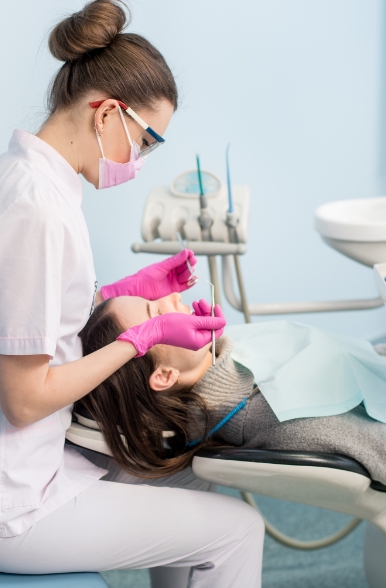
Tucson Smiles Pediatric Dentistry is available if your child has a dental emergency.
If you are a patient of record and are experiencing a dental emergency, please page
our doctor on call at 520-302-5685.
Common Dental Emergencies:
Swelling – If the face is swollen because of a tooth infection, it could be a life-threatening situation and your child needs to go to a hospital emergency room immediately. Place a cold compress on the face until you can see a doctor. Call our office for an emergency appointment to evaluate where the infection is and how to treat it.
Cut or Bitten Tongue, Lip or Cheek – If there is bleeding, apply firm yet gentle pressure to the area with a clean cloth or gauze. If you cannot get the bleeding to stop after fifteen minutes, go to the hospital emergency room. Apply a cold compress to swollen or bruised areas. Make sure your child is comfortable and calm. Call our office for an appointment to assess any injury to the teeth, jawbone or tissues around the mouth.
Bleeding After Baby Tooth Falls Out – Have your child bite on a clean folded cloth or gauze for fifteen minutes and make sure he/she is resting. Repeat this if necessary.
Knocked Out Baby Tooth – Baby teeth should NOT be put back into the mouth because it may damage the growing permanent tooth. Your child still needs to be seen at the office to find out if any other teeth, the jawbone or tissues around the mouth are injured.

Knocked Out Permanent Tooth – Contact a dentist immediately. Time is a critical factor in saving a permanent tooth. Find the tooth and gently rinse off any dirt with room temperature water. Hold the tooth by the crown, not the root, and do not scrub it. Place the tooth into its socket and have your child hold the tooth in place. If you are not able to reinsert the tooth, put it in a cup with milk and bring it to the dentist.
Broken Tooth – Rinse dirt from the injured area with warm water. Place a cold compress over the face in the area of the injury to reduce swelling. Call our office immediately to assess further injuries, prevent infection and repair the tooth.
Cold / Canker Sores – Many children occasionally suffer from cold sores around the lips and canker sores inside the mouth. These sores usually take seven to fourteen days to heal. There are products at your local pharmacy that will help relieve the pain. Please let us know if these sores occur often or last longer than usual. Some serious diseases may begin as sores and need prescription medications.
Most Common Causes of Injury to Teeth – These are bathtubs, tile floors, coffee tables, stairs, swimming pools, play structures, bicycle riding, trampoline, basketball, baseball, playing in construction zones and scooters. Professionally fitted mouth guards can prevent injuries to the teeth and are offered by our office.


Did You Know?
The leading causes of cavities are a diet of high sugars and lack of brushing and flossing. The longer your child chews on their food, the longer the residue stays on their teeth, the more acid forms and the greater the chances of cavities.
Parental involvement is extremely important. Prepare your child for their first visit by reinforcing a positive attitude:
- Playing pretend dentist
- Reading books that involve a dental visit
What Causes tooth decay?
- Bacteria that live on teeth consumes sugar and then uses it to manufacture acids
- The acids dissolve teeth
- The dissolved tooth becomes infected
- This infection is called decay
Pedodontics is the branch of dentistry dealing with the teeth and mouth conditions of children. Pediatric dentistry is the specialty of dentistry that focuses on the oral health and unique needs of young people.
Children should be weaned from the bottle at 12-14 months of age.
It is very important to care for your young child’s teeth. Early Childhood Caries (ECC), or tooth decay can affect a child’s body weight, growth and the overall quality of life of a child.
It is very important that primary teeth are kept in place until they are lost naturally. These teeth serve a number of critical functions.
Four things are necessary for cavities to form:
- a tooth
- bacteria
- sugars or other carbohydrates, and
- time.
